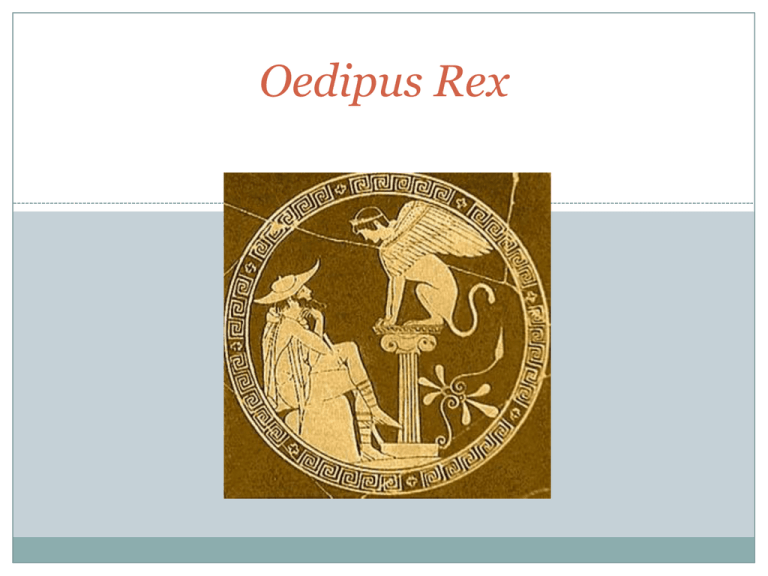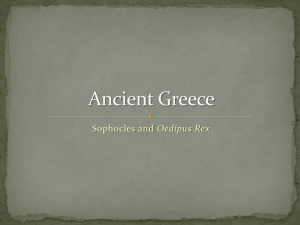Oedipus Rex - Cloudfront.net
advertisement

Oedipus Rex Theater of Dionysus, Athens Genre’s Characteristics A tragedy is a serious drama featuring a main hero or main character, often of noble birth, who strives to achieve something and is ultimately defeated. The structure of most Greek tragedies presents a tight, formal arrangement of parts: Prologue: opening scene of the play Alternating sections of the Chorus’s lyric songs and conversation of the play’s characters Exodus: concluding scene of a play Sophocles Born in 495 B.C. near Athens, Greece At 28 years old he entered his first City Dionysia. Sophocles went on to write 120 plays, winning 18 first prizes and never less than second place. Sophocles was an active citizen and also served as a priest, on the Board of Generals, and as an actor. Oedipus….the trilogy! The First of a Trilogy: Oedipus Rex Oedipus at Colonus Antigone But written as: Antigone Oedipus Rex Oedipus at Colonus Characters Oedipus (the King) Jocasta (the Queen) Creon (Jocasta’s brother) Teiresias (blind prophet) Laius (former king of Thebes) Chorus Served as intermission, commentators, mood-setters, and performed lyric poetry to honor the gods The Story The story would have been familiar to Sophocles’ audiences: Jocasta and Laius have a son, but there’s a prophecy attached. They tie his ankles and send him away with a shepherd. The shepherd gives the baby to the King and Queen of Corinth, who raise him as their own. Oedipus hears of a prophesy and so runs away to try and avoid it. On the way to Thebes, Oedipus meets Laius and kills him. He also answers the Sphinx’s riddle and saves Thebes. FYI: the Sphinx was a winged, man-eating creature with a lion’s body and a woman’s head. Are you clever enough to answer the riddle? • “What walks on four legs in the morning, two legs in the afternoon, and three legs in the evening? When Oediphs solves the riddle, the Sphinx kills herself and Oedipus inherits the throne of Thebes (which also includes its queen, Jocasta!). Themes Fate vs. free will Power/irony of sight Emotion vs. control Authority: use and misuse Divine vs. human wisdom Terms to know tragic hero: character who makes an error of judgment or has a fatal flaw which, combined with fate and external forces, brings on a tragedy. hamartia: wrong-doing, error, (fatal or tragic) flaw, injury committed in ignorance hubris: pride, not being aware of your human limitations catharsis: emotional purging Apollo: in the Age of Reason en media res: in the middle of the action dramatic or tragic irony: a literary technique, originally used in Greek tragedy, by which the full significance of a character's words or actions are clear to the audience or reader although unknown to the character. -Oxford American Dictionary Oracle at Delphi Most important shrine in Greece—for the god Apollo Built around a sacred spring; it was considered to be the “omphalos” (the navel)—the center of the world. Priestess of Apollo—Pythia— gave cryptic answers to those seeking answers. Thanks to: http://www.wepapers.com/Papers/7348 6/Oedipus_the_King_by__Sophocles.p pt http://www.ap- english.com/home/Oedipus.html



